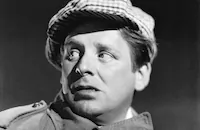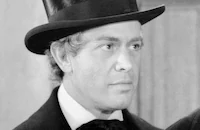Absolute Quiet

Brief Synopsis
Cast & Crew
George B. Seitz
Lionel Atwill
Irene Hervey
Raymond Walburn
Stuart Erwin
Ann Loring
Film Details
Technical Specs

Synopsis
After Gerald A. Axton, a domineering tycoon, sends his mistress, Zelda Tadema, and down-on-his-luck actor Gregory Bengard to Hollywood on a plane, he has a slight heart attack and is ordered to take a rest at his Western ranch. At the isolated ranch, he sends Kedro, his handyman, to town for the night, then promises his secretary, Laura Tait, that her co-pilot husband Barney will be flying in that night. Meanwhile, though, Axton orders Barney and his drunken pilot to take off for "urgent business" during a dangerous fog. As Axton and Laura listen to radio weather reports, another plane, carrying Axton's political enemy, Governor Sam Pruden, is lost in the fog and forced to attempt a landing at Axton's private airfield. Just before they land, however, two escaped condemned convicts, Judy and Jack, arrive and take Axton and Laura hostage. Because they refuse to let Axton turn the landing field's lights on, the plane crashes, killing the pilots and injuring some of the others, including Zelda and Gregory, who has serious facial scars. After the crash, Pruden tries to stop reporter Oscar "Chubby" Rudd from contacting his paper about the governor's obvious cowardliness. Then Jack and Judy, pretending to be Axton's niece and her husband, cut the telephone wires, making the radio their only contact with the outside world. Axton secretly urges Judy and Jack to force the governor to pardon them after their true identities are revealed, and they hold him at gunpoint. Hoping to ruin Pruden's career, Axton urges him to write the ludicrous pardon. Euphoric over their pardon, Judy and Jack discuss giving up crime to go back into vaudeville, while Axton stirs up other members of the group with cruel talk. Then Judy and Jack try to get the governor to give them assurance that their pardon will stick, as he plans to release a story about his heroism during the ordeal. Axton tries to convince him that Jack and Judy should be the heroes of the story, though, thus justifying their pardons. During their argument, Gregory, insane with worry over the end of his career, enters the room and shoots Jack and Judy and they die in each other's arms. Just after they die, Barney's plane lands safely at the same time that an ambulance arrives. As Laura and Barney are reunited, the governor says he will never be the same, to which Axton replies that if that is true, then Jack and Judy had not lived in vain.

Director
George B. Seitz
Cast

Lionel Atwill
Irene Hervey

Raymond Walburn

Stuart Erwin
Ann Loring

Louis Hayward

Wallace Ford
Bernadene Hayes

Harvey Stephens

J. Carroll Naish
Matt Moore
Robert Livingston
Charles Trowbridge
William Newell
Edwin Maxwell
Kitty Mchugh
Aldexander Du Cross
Jessie Rosenquist
Harry Geise
James Bush
Phil Tead

Lee Phelps
Monty Vandergrift
Crew
Robert Barnes
Harry Clork
John W. Considine Jr.
Cedric Gibbons
James Havens
Conrad A. Nervig
Douglas Shearer
Dolly Tree
Franz Waxman
Lester White
Edwin B. Willis
George F. Worts

Film Details
Technical Specs

Articles
Absolute Quiet
By Richard Harland Smith

Absolute Quiet
Quotes
Trivia
Notes
A preproduction news item in Hollywood Reporter refers to the film as Absolutely Quiet, but this May have been a typographical error.
















